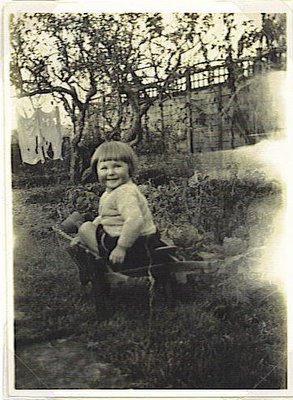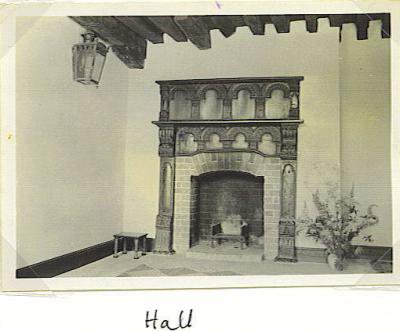CERNE ABBAS 1940-1945. (9)
Although the first rockets fell on London on September 8th 1944, there is no mention of them in my father's letters until 14th November when he wrote:

Toys must have been difficult to get during the War years. My Chad Valley teddy-bear had been bought early in the War, and I had a few dolls and toy animals, all much loved. When we went to stay with my Whittaker grandparents, I was allowed to play with another beautiful Victorian doll called Rosie. She was smaller than the one given to me by grandpa Squibb, but she too had an extensive wardrobe of clothes and was probably far too valuable for a young child to be playing with. However I always looked forward to being reunited with her on my visits, and took great care of her.
One of my favourite dolls was Edith. My mother made her out of some of her old lisle stockings stuffed with kapok, she was taller than me and no beauty. My mother made the head first and thought the face - with its red felt lips, eyes with half black "popper" fastenings for the pupils and black woolly hair tied in pigtails - was so ugly that I might be frightened by it. So she showed me the head first, to see my reaction, but when I just laughed at it she went ahead and made the rest. Edith wore my old dresses and had lovely floppy arms and legs.
A toy inherited from my mother was a black cat, about a foot long, called N****r. Her mother had tried to dissuade her from buying him, as she thought there were other toys in the shop which were a lot more attractive, but my mother had been determined and had insisted that N****r was the only one she wanted. He had been much loved by her, and his fur was very worn out by the time he was passed on to me, so she made him a coat out of some scraps of red leather, added some "medals" made from Christmas cracker charms, and he became a Chelsea pensioner.
So in November 1944 it must have seemed a real "find" when, with great delight, my mother found a doll's house for me. My father wrote:
My mother had kept all her own doll's house furniture which was an added bonus, and after the War, she had fun in Hamleys finding more. I remember the day it was given to me, and can picture it placed in the room next to the kitchen, by the right of the door leading into the hall.

My grandfather Squibb was asked if he would try to get me Alice Through The Looking Glass for Christmas, as Alice In Wonderland had been such a great success.
The last letter in the 1944 series deals with my father's birthday on December 1st, and encloses a drawing done by me of what I call "a sideways man", said to be dancing. I had been taken to lunch at Judge Jeffrey's Restaurant in Dorchester for the first time, and the waitress had given me a lump of sugar as a reward for good behaviour.
"J.J's" was to be our regular lunch time venue when in Dorchester for many years to come. We always sat at the same table, in the front window which overlooked High West Street and the Museum opposite. At that time, all the round oak tables and Windsor chairs were genuine antiques, as were the pictures on the walls: mostly coloured engravings of hunting and coaching scenes. Pieces of armour and swords hung on the walls in the back room, where there would be a blazing log fire in the huge fireplace on cold winter days. On a wall near the window hung an Act of Parliament Clock. All of these pieces were later sold and replaced with reproduction furniture when, under new management, their value as antiques came to be realised.
There was another room at the back, called the New Room. This had been built just before the War and lacked the character of the older part of the building, so we only used it if the restaurant was full. I remember the three course set lunch cost 2s 6d for quite a long time, increasing to 5s in the 1950's. The delicious bread rolls at lunch time were baked on the premises, as were the cakes at tea-time. Flapjacks were my father's favourites - he called them "cold porridge".
<< Previous post · First post · Next post >>
"The papers seem to be making a great deal of fuss about these rockets, but they do not appear to be anything like such a nuisance as the flying bombs were during the summer. I think that most of them must fall a good way from London and it is said that a lot of them explode in the air. Life must be pretty miserable in some of the German towns these days."Perhaps he would have had a different opinion had a rocket landed on the Temple, or maybe he was just trying to reassure his father that life in London was not as dangerous as he feared; but London only survived what could have been the most dangerous of weapons because they were expensive to produce and there were too few, too late. The allied armies over-ran most of the launching sites soon after attacks began.

Toys must have been difficult to get during the War years. My Chad Valley teddy-bear had been bought early in the War, and I had a few dolls and toy animals, all much loved. When we went to stay with my Whittaker grandparents, I was allowed to play with another beautiful Victorian doll called Rosie. She was smaller than the one given to me by grandpa Squibb, but she too had an extensive wardrobe of clothes and was probably far too valuable for a young child to be playing with. However I always looked forward to being reunited with her on my visits, and took great care of her.
One of my favourite dolls was Edith. My mother made her out of some of her old lisle stockings stuffed with kapok, she was taller than me and no beauty. My mother made the head first and thought the face - with its red felt lips, eyes with half black "popper" fastenings for the pupils and black woolly hair tied in pigtails - was so ugly that I might be frightened by it. So she showed me the head first, to see my reaction, but when I just laughed at it she went ahead and made the rest. Edith wore my old dresses and had lovely floppy arms and legs.
A toy inherited from my mother was a black cat, about a foot long, called N****r. Her mother had tried to dissuade her from buying him, as she thought there were other toys in the shop which were a lot more attractive, but my mother had been determined and had insisted that N****r was the only one she wanted. He had been much loved by her, and his fur was very worn out by the time he was passed on to me, so she made him a coat out of some scraps of red leather, added some "medals" made from Christmas cracker charms, and he became a Chelsea pensioner.
So in November 1944 it must have seemed a real "find" when, with great delight, my mother found a doll's house for me. My father wrote:
"Bessie came across a great rarity in the shape of a doll's house the other day. It is so big that we have not been able to hide it until Christmas, so Elizabeth is having great fun - and I think that Bessie is enjoying herself almost as much as Elizabeth! She got the doll's house from the grocer's assistant. It seems to be of some age and has been very well kept. It will be many a long day before such a thing can be bought in a shop again, for it could not be made within the maximum price now allowed for toys."
My mother had kept all her own doll's house furniture which was an added bonus, and after the War, she had fun in Hamleys finding more. I remember the day it was given to me, and can picture it placed in the room next to the kitchen, by the right of the door leading into the hall.

My grandfather Squibb was asked if he would try to get me Alice Through The Looking Glass for Christmas, as Alice In Wonderland had been such a great success.
The last letter in the 1944 series deals with my father's birthday on December 1st, and encloses a drawing done by me of what I call "a sideways man", said to be dancing. I had been taken to lunch at Judge Jeffrey's Restaurant in Dorchester for the first time, and the waitress had given me a lump of sugar as a reward for good behaviour.
"J.J's" was to be our regular lunch time venue when in Dorchester for many years to come. We always sat at the same table, in the front window which overlooked High West Street and the Museum opposite. At that time, all the round oak tables and Windsor chairs were genuine antiques, as were the pictures on the walls: mostly coloured engravings of hunting and coaching scenes. Pieces of armour and swords hung on the walls in the back room, where there would be a blazing log fire in the huge fireplace on cold winter days. On a wall near the window hung an Act of Parliament Clock. All of these pieces were later sold and replaced with reproduction furniture when, under new management, their value as antiques came to be realised.
There was another room at the back, called the New Room. This had been built just before the War and lacked the character of the older part of the building, so we only used it if the restaurant was full. I remember the three course set lunch cost 2s 6d for quite a long time, increasing to 5s in the 1950's. The delicious bread rolls at lunch time were baked on the premises, as were the cakes at tea-time. Flapjacks were my father's favourites - he called them "cold porridge".
<< Previous post · First post · Next post >>


2 Comments:
This is a fantastic account. What a great idea, not only to keep these records, but also to make them available on the net - and the photographs contribute terrifically as well. Do keep it up. I've heard of your father - he was a bencher wasn't he? And I've got his book on the Court of Chivalry which is still in print and have seen his book on Doctors Commons in the library.
Thanks for that, Anon. My grandfather was a QC, and Master of the Inner Temple for a year (I'm not sure when), as well as holding the title of Norfolk Herald Extraordinary. Oh, and he was also Commons Commissioner in the 1970s (sorting out disputes regarding common land), and sat at Quarter Sessions in Dorchester until their abolition. He also had a big case in the 1950s which involved re-convening the Court of Chivalry after many years.
Post a Comment
<< Home